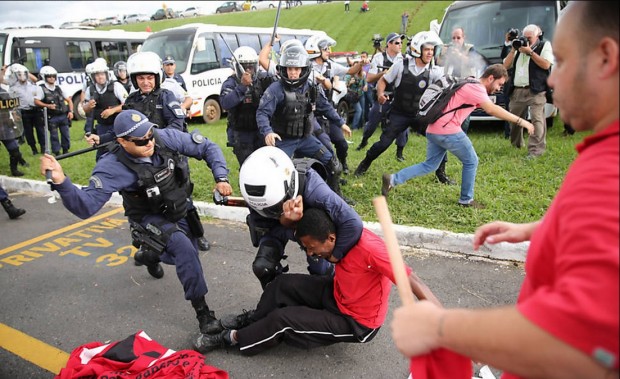Why do ‘pro-government’ protesters battle cops, while pro-impeachment protesters hug them? Which team are these guys on, again? A guide to the current crisis
Vincent Bevins
São Paulo
I just spent a month away from Brazil, which served to remind me of just how inscrutable the struggles currently rocking this country are to foreign observers. They may know that things are not as rosy as they were a few years ago, or that “the government” has messed up or is in trouble. But the contours of the battles are extremely blurry.
For example. Last week, protesters clashed violently with police outside Congress in Brasília during a demonstration against a new legislative project (pictured above). A few days later, on Sunday, a much larger group of protesters, some of whom smiled and posed for selfies with heavily armed cops, cheerfully filled streets around the country,
It is indicative of the topsy-turvy world that crisis-ridden Brazil has entered that the bloody demonstrators battling cops were the ‘pro-government’ protesters, while the cheerful, carnavalesque crowds were calling for the president to be impeachment and her party to be demolished.
That’s because “the government” is not just one government these days, and a number of players (some even less scrupulous than the others) are currently engaged in a fight for its future.
So who are they? What do they want? What are their chances?
The government, part 1 (executive)
President Dilma Rousseff, of the left-leaning Workers’ Party (PT), was re-elected in October and began her second term in January.
The PT has controlled the Presidency since Luiz Inácio “Lula” da Silva took over in 2003. By any global standard, Lula’s time in power was good for Brazil. Buoyed by high prices for its commodities, the economy surged forward, and moderate social programs helped roughly 40 million people rise from poverty into the “new middle class.” He left office with record levels of support.
Dilma, former left-wing guerrilla and Lula’s hand-picked successor, took over in 2011 and enjoyed widespread support for a while. But the commodity boom ended and the economy slowed down amid mistakes made by Dilma’s government. Then the June 2013 protests happened, and so did the World Cup, which only turned out pretty well in contrast to the mess it was expected to be, and because Brazilians were polite enough to keep their rage about wasteful spending to themselves while the foreign fans were here.
By the 2014 election, Dilma had lost much of the goodwill Lula had bestowed to her. She barely beat out opponent Aécio Neves (PSDB) by frantically appealing to the working poor and middle-class leftists, denying many of the economic problems the country faced and promising what we all knew she couldn’t deliver in the short term.
She won, promptly installed a Finance Minister that her core supporters (and probably she herself) consider ‘neoliberal,’ who embarked on a series of painful adjustments as the dire economic straits Brazil finds itself in became exceedingly obvious. For the first time since 2003, regular people’s lives not only stopped improving, but in some cases, began to get worse. And all the while, since the middle of last year, it slowly emerged that the Federal Police have built a credible case that the state-run oil company, Petrobras, funneled billions of dollars to huge construction companies, who then passed some of the bribes on to political parties.
The government, part 2 (legislative)
If Brazil were a monarchy, that would be it. Rousseff would be “the government.” But Brazil is a loose federal republic with a staggering 28 parties active in its two legislative houses, and 26 state governors who each control their own police forces.
Much of Lula’s success was attributable to his ability to cobble together an unlikely coalition of parties and economic actors and thus keep the party going. This group has included right-wing parties, major figures Lula used to bitterly oppose, one president already impeached for corruption, and big parties who may not believe in much, other than the spoils of power.
Maintaining this kind of a coalition is a lot easier if you have Lula’s charisma and political capital. It’s even easier if you have so much money flowing in that you can make everyone in the country richer at the same time.
Dilma has none of this at the moment, and it’s all falling apart.
Amidst the chaos and political weakness of the first few months of Dilma’s second term, the PT lost control of Congress. The “catch-all, pork loving” PMDB has gained control of the Presidency of both houses and is openly rebelling against Dilma. Eduardo Cunha, an evangelical Christian, has been especially combative. Contributors to this blog have made it pretty clear who these guys are. It is not only that have they taken advantage of Dilma’s weakness. They are also reportedly furious that both of their Congressional leaders, Renan Calheiros and Cunha, have been named in the investigation into the Petrobras corruption scandal.
Recently, they have been pushing a bill that allows for more companies to treat employees as contractors. The PT hates this law, and so do the left-wing and union protesters that marched against it last week in Brasília. That’s who battled cops in Brasília last week, decked out in red. They support “the government” (Dilma) against right-wing threats, but despise Cunha and company.
Many people want Neves and the PSDB in power. Many, but less than before, want Dilma’s PT to hold on and thrive. But few people will tell you they love these guys.
The protesters, 2015 edition (green and yellow)
On Sunday, hundreds of thousands of people took to the streets around the country to denounce Dilma and call for her impeachment. This was less than they mustered a month earlier, but this group and its demands are not going away.
These protesters want Dilma gone, now, and mostly hate the PT passionately. A small minority call outright for military intervention. Anecdotally speaking, these people have not felt represented by the PT government in years, and their anger has exploded further since the October election. Studies suggest they are wealthier and whiter than average Brazilians, and that they are most likely to take their cues from Brazil’s most right-wing major publication.
According to this study, they also hold some strange beliefs. A majority said they think the PT “wants to impose a communist regime in Brazil.” The Economist recently called them a “Tropical tea party.” They are usually law and order voters, which explains why some of them embrace the police that terrify many poor Brazilians and traditional protest groups.
But it is not enough to just wave one’s hands, and say that Brazil has always had a small but powerful right-wing section of the elite, that they never liked the PT anyways and hold views that many English-language readers would find bizarre. That may describe some of the core demonstrators who are actually in the streets. But it’s also important to recognize why they’ve been able to step into the spotlight now, and that many regular people are sympathetic to their broader demands.
Another recent poll made very difficult reading for the PT. Datafolha reported that 63% of respondents support an impeachment process against President Rousseff. And 3/4 of respondents said they supported the recent protests around the country.
This must include many people that voted for her. And it’s not hard to see what explains this swing. Things have gotten worse.
Social movements, unions, and the left (protesters in red)
But it’s not just the rich, white, and conservative that are upset. Many of the core supporters of the PT project had hoped that Dilma would follow up on her left-wing campaign with a shift to the left. She did not. They were doubly mortified to see the country fall into the hands of her former conservative allies in Congress, who have been eager to push an agenda they consider homophobic and a serious threat to labor rights.
In much smaller numbers, they took to the streets yesterday, alongside fast food workers, to protest this new direction. These guys come from the traditional left, and have traditionally clashed with police at times.
And while they bitterly oppose the other group of protesters, accusing them of being golpistas, they are also an outgrowth of real discontent with the status quo. They would argue that to tackle the very real popularity problems the Datafolha survey revealed, the PT should return to its left-wing roots.
It’s also notable that Brazilians, perhaps fed up with the system in general, have been quite eager to support all kinds of protests recently. In 2013, a remarkable 89% supported the protests started by an anarchist-leaning student group after they exploded into wider demands for better public services and an end to corruption.
Who will triumph? (pure speculation)
Marxists and free-market liberals alike sometimes make the mistake of thinking that if things just get bad enough, a solution they like will appear. The radical left looks to 1917, and liberals look to 1989, as evidence of this. But what happens more often is that things just sort of muddle along, in a dispiriting and crappy way, with no easy way out.
While admitting that anything could happen, I’ll venture three possibilities for the next few years. The first is that the political and legal circumstances change, and Dilma is actually impeached. For now, this seems unlikely, but it is possible. In any case, it would only be a victory for the yellow-green protesters in that it would be a blow to the PT. Their preferred representatives would be extremely unlikely to take over. Another possibility is that the PT manages to retake control of the situation, getting the economy back on track and moving into a position in Congress where it can satisfy some of its core supporters. This road looks very difficult from here.
But more likely, in my opinion, is that Dilma will remain weak for the near future, with Minister Levy managing to do enough with the economy to avert disaster, but unable to unleash the country’s full potential, while a rudderless Congress is taken in a new and sometimes strange direction.
Not very exciting, I know. But those are the battle lines for now.



